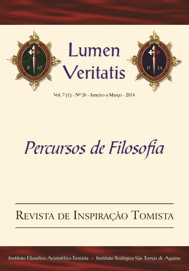El concepto de “divinitus revelabilia” en la comprensión de la autonomía de la filosofía
Palavras-chave:
Divinitus revelabilia, divinitus revelata, cognoscibilia, sacra doctrina, lumen fidei, lumen naturaleResumo
La categoría teológica de lo “divinitus revelabilia”, inherente a la sacra doctrina según la define Tomás de Aquino, está íntimamente relacionada con el papel de la doctrina de la causalidad eficiente en la comprensión de la interacción entre el lumen fidei y el lumen naturale mentis humanae en el ámbito de la propia sacra doctrina. Ambos agentes —divino y humano— constituyen las dos causas eficientes —principal e instrumental, respectivamente— del único objeto formal de la reflexión. Ello ayuda a comprender mejor no sólo la autonomía de la filosofía en cuanto característica constitutiva de pleno derecho, sino también la relación entre fe y razón como “desigualdad proporcionada”, donde la fe, que tiene siempre la primacía, no sólo no supone un obstáculo a la operación de la razón, sino que permite su sublimación por encima de sus propias capacidades naturales. /// The theological category of “divinitus revelabilia”, inherent in sacra doctrina as defined by Thomas Aquinas, is closely related to the role of the doctrine of efficient causality in the understanding of the interaction between the lumen fidei and the lumen naturale mentis humanae in the ambit of sacra doctrina itself. Both agents —divine and human— constitute the two efficient causes —principal and instrumental, respectively— of the single formal object of reflection. This helps in better understanding not only the autonomy of philosophy as a constitutive characteristic of full right, but also the relationship between faith and reason as “proportionate inequality” where faith, which always holds primacy, not only does not present an obstacle to the operation of reason, but in fact permits it to surpass its own natural capacitiesEdição
Seção
Articles






